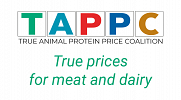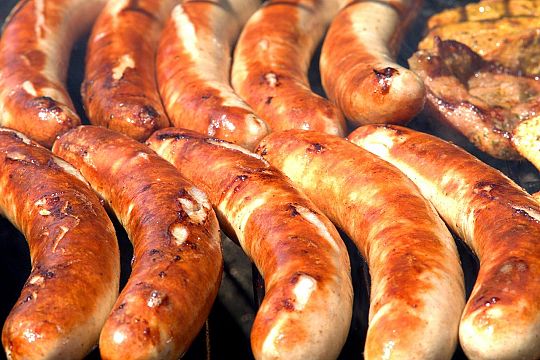Scientists ask OECD countries to reduce meat and dairy consumption
During the COP25 in Madrid, hundreds of scientists asked ministers of OECD countries to reduce meat consumption and production, for many reasons. Here is their letter:
Scientists Call on OECD Countries to Reduce Meat and Dairy
This letter will be made public just before the COP25 summit in Madrid, Spain which begins on Dec. 2nd, 2019. Signatures will remain open after; however, to be counted for the press/social media release, sign-ons must be in by close of business, 28th of November 2019.
We invite you to please opt-in here if you agree with its contents. We will then add your name to the letter which will be hosted at the URL https://www.scientists4lessmeat.org/
--------------------------------
Dear Presidents, Prime Ministers and Heads of State of OECD countries (1),
Scientific consensus of currently observed and projected future climate and biodiversity impacts clearly calls for the rapid transformation of our society at all scales and across all sectors, in order to maintain a safe climate and planet for the future of humanity. This transformation must also include the food system, and especially the livestock sector - a fact that has not yet been acknowledged sufficiently in climate politics.
Between 21% and 37% of all greenhouse gas emissions are attributable to the food system (2), with direct emissions from livestock contributing 14.5% of all human greenhouse gas emissions (3). Meat and dairy production contributes greatly to tropical deforestation emissions. It has recently been shown that a sixth of the carbon footprint of average diets in Europe is due to such emissions (4). This is because livestock production requires large amounts of feed which are often produced from cropland expanding into newly deforested land (5) or other natural ecosystems.
Reducing supply and demand for livestock products, by producing less meat and dairy globally and eating less meat and dairy in regions with excessive consumption, will, therefore, be critical for addressing the climate emergency. Tackling overconsumption, starting with stringent measures in privileged societies, will also free up agricultural lands for growing human food rather than livestock feed.
According to recent scientific analysis, land-related climate actions offer up to 30% of mitigation needed for a 1.5ºC world, adding forest protection, ecosystem restoration and changes in agriculture systems, to the necessary transformation in energy, industry and transport (6).
However, land-related climate actions, and in particular food-system actions, have not yet received proportionate attention in international climate politics.
The IPCC’s special report on Climate Change and Land points to multiple solutions that can boost both mitigation and adaptation (7). Dietary change is one of these key response options which will have positive impacts on mitigation, land degradation and food security (8). Yet, this climate action measure is, today, absent from all submitted countries’ pledges to implement emissions reductions towards the Paris Agreement (Nationally Determined Contributions (NDCs) (9).
We call on Governments of OECD member countries to:
1) Consider the need for reducing the production and consumption of meat and dairy within global climate negotiations, including UNFCCC, as an important component of the ambition in countries’ pledges to implement emissions reductions towards the Paris Agreement (National Determined Contributions). At the same time, increase ambition on land sector climate action in nature-based solutions, especially through protection and restoration of forests and other ecosystems (10).
2) Include dietary changes, for example, an aim to achieve planetary healthy diets (11) as part of climate action plans at all levels of government (as many cities are already doing (12)).
3) Shift financial and policy incentives away from environmentally-damaging production practices towards measures supporting farmers in the transition to food systems that enable nutritionally and climate adequate diets and which also protect biodiversity.
In addition, we are asking that the COP Secretariat lead by example by publicly announcing at COP25 a commitment to requiring that host countries should serve locally sourced, mainly plant-based food at all subsequent UNFCCC-sponsored global conferences from COP25 onward which should include a plan to reduce food waste and disposable packaging.
These measures will significantly contribute to protecting forests and to reshaping the global food system through dietary change, which are two key solutions to the escalating land and climate crisis. As scientists working for the public good, we are ready to provide you with further scientific evidence about these important topics during the forthcoming UNFCCC COP meetings and beyond.
Sincerely,
The undersigned
Pete Smith, Professor of Soils & Global Change, University of Aberdeen, UK. FRS, FRSE, FNA, FRSB
(See full list of signatories here - https://www.scientists4lessmeat.org/)
___________________________________________________________________________
Note: Signatories speak on their own behalf, and not on behalf of their affiliated institutions.
References
(1) OECD members are high-income economies with a very high Human Development Index (HDI) and are regarded as developed countries. We address the letter to OECD members which are also high meat-consuming countries with a greater responsibility and ability to address this issue. There are 36 member countries: Australia, Austria, Belgium, Canada, Chile, Czech Republic, Denmark, Estonia, Finland, France, Germany, Greece, Hungary, Iceland, Ireland, Israel, Italy, Japan, Korea, Latvia, Lithuania, Luxembourg, Mexico, the Netherlands, New Zealand, Norway, Poland, Portugal, Slovak Republic, Slovenia, Spain, Sweden, Switzerland, Turkey, United Kingdom and United States.
(2) IPCC Climate Change and Land, Summary for Policymakers, Table 1, page 9. August 2019.
(3) Gerber, P.J., Steinfeld, H., Henderson, B., Mottet, A., Opio, C., Dijkman, J., Falcucci, A. & Tempio, G. 2013. Tackling climate change through livestock – A global assessment of emissions and mitigation opportunities. Food and Agriculture Organization of the United Nations (FAO), Rome.
(4) Pendrill, F., Persson, U.M., Godar, J., Kastner, T., Moran, D., Schmidt, S. & Wood, R. 2019. Agricultural and forestry trade drives large share of tropical deforestation emissions. Global Environmental Change, 56, 1-10.
(5) Smith, P. 2018. Managing the global land resource. Proceedings of the Royal Society B: Biological Sciences, 285: 20172798.
(6) Roe, S., Streck, C., Obersteiner, M., Frank, S., Griscom, B., Drouet, L., Fricko, O., Gusti, M., Harris, N., Hasegawa, T., Hausfather, Z., Havlík, P., House, J., Nabuurs, G.-J., Popp, A., Sánchez, M. J. S., Sanderman, J., Smith, P., Stehfest, E. & Lawrence, D. 2019. Contribution of the land sector to a 1.5 °C world. Nature Climate Change, 9: 817-828.
(7) IPCC Climate Change and Land, Summary for Policymakers. August 2019.
(8) IPCC Climate Change and Land, Summary for Policymakers. SPM Figure 3A. August 2019.
(9) Roe, S., Streck, C., Obersteiner, M., Frank, S., Griscom, B., Drouet, L., Fricko, O., Gusti, M., Harris, N., Hasegawa, T., Hausfather, Z., Havlík, P., House, J., Nabuurs, G.-J., Popp, A., Sánchez, M. J. S., Sanderman, J., Smith, P., Stehfest, E. & Lawrence, D. 2019. Contribution of the land sector to a 1.5 °C world. Nature Climate Change, 9: 817-828.
(10) As recommended by both the IPCC report on Climate Change and Land and the IPBES report on Biodiversity. IPCC Climate Change and Land, Summary for Policymakers. IPBES 2019 Global Assessment Report on Biodiversity and Ecosystem Services.
(11) Willett, W., Rockström, J., Loken, B., Springmann, M., Lang, T., Vermeulen, S., Garnett, T., Tilman, D., DeClerck, F., Wood, A., Jonell, M., Clark, M., Gordon, L. J., Fanzo, J., Hawkes, C., Zurayk, R., Rivera, J. A., De Vries, W., Majele Sibanda, L., Afshin, A., Chaudhary, A., Herrero, M., Agustina, R., Branca, F., Lartey, A., Fan, S., Crona, B., Fox, E., Bignet, V., Troell, M., Lindahl, T., Singh, S., Cornell, S. E., Srinath Reddy, K., Narain, S., Nishtar, S. & Murray, C. J. L. 2019. Food in the Anthropocene: the EAT−Lancet Commission on healthy diets from sustainable food systems. The Lancet, 393: 447-492.
(12) https://www.c40.org/press_releases/good-food-cities


